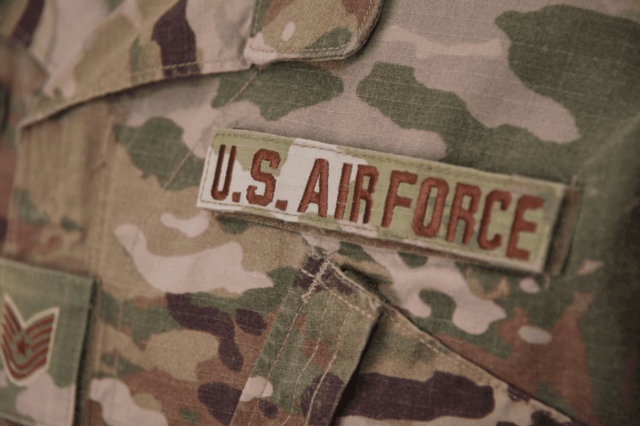
Military COVID-19 vaccine mandate forces Air Force officer to choose between his faith and his career U.S. Air Force uniform. (U.S. Air National Guard photo illustration by Tech. Sgt. Daniel Ter Haar)
A Roman Catholic lieutenant colonel in the United States Air Force was forced to choose between his faith and his career when his superiors pressured him to retire early after warning him that the odds of being granted a religious exemption for the COVID-19 vaccine were “slim to none.”
The active-duty officer, who requested anonymity due to concerns of retribution, told American Military News that he was forced into early retirement over the Biden administration’s COVID-19 vaccine mandate.
When the mandate was first announced, the officer assumed he would be granted a medical exemption due to a previous reaction to vaccines. His allergist had specifically told him “don’t get any more shots” following a serious case of anaphylaxis.
To his shock, the Air Force medical review board denied his request for a medical exemption, claiming the officer was not allergic to anything in the vaccines.
After his medical exemption request was denied, the officer decided to pursue a religious exemption.
“I knew that was going to be a tougher road just based on what I had been hearing through the rumor mill – that ‘nobody was getting a religious exemption.’ That was the word at the time and its turned out to be fairly true,” he said.
On Feb. 8, the U.S. Air Force approved its very first religious exemption to the vaccine, and that number increased to 19 exemptions approved by Mar. 7. The service has received more than 9,200 religious exemption requests.
Despite the odds being stacked against him, the officer pursued a religious exemption. He said that the explanation he gave the chaplain reviewing his request was two-fold: he couldn’t take the vaccine due to the use of fetal cells in its development, and he believes that the vaccine violates “God’s design.”
“I am religious, but I don’t wear it on my sleeve. I am not here to convert you to my religion. I keep my faith within my family and within my church. But it’s a deeply held belief that you should not use anything like this,” the officer told American Military News. “They brought up the ‘Well, Tylenol or Motrin or some other drugs have been tested on this.’ And I’m like, ‘I understand that and I have not used any of those for over 10 years.”
“The chaplain that I talked to provided me with the memo that he sent up to the religious team, which said, ‘Yes, I believe he is acting in good faith. He meets the standard for a religious exemption,’” he said.
Around the time that he applied for the religious exemption, the Air Force published new guidance stating that service members who retire by April 1 do not have to get the shot, and it would “be an administrative refusal versus getting the medical or religious waiver.”
Nearing the end of his Air Force career, the officer previously planned to retire later this year, but pressure from his boss forced the officer to move his retirement date up nearly 6 months.
“My boss was saying, ‘You need to [retire April 1] because the religious waiver does not look like it’s going to work,’” he said. The officer asked if he would be able to keep the application process moving forward even if he bumped his retirement date up “so when I retire, I can take it to another employer and say that the [Department of Defense] has granted me a religious waiver.”
“They said, ‘No, it’s not going to go through. The chances of it actually making it are slim to none,’” the officer added.
The officer said he knows of other service members who are “in the same boat,” but who are not eligible for retirement.
“From what they’ve told me, they are looking like they will be forced out,” he said.
While his decades-long career in the U.S. military is not ending as planned, the officer said he still loves the Air Force, but is afraid of where what he views as the service’s new political agenda will lead.
“I bleed Air Force blue. I would stay in until they actually dragged me out if I had a choice,” he said. “But the general feeling is, we’re supposed to be apolitical and it seems like we’re turning into a political organization.”
“I do really want my story to be heard, but I have that nagging feeling to where you tell somebody and then you all of a sudden end up in a worse situation,” the officer added, highlighting his concerns that speaking out against the United States military for religious liberty violations could have serious consequences. “It’s sad that you have to think about that, but with me, I still have a family. It’s not just me being retired and done. I still have to take care of my family.”




